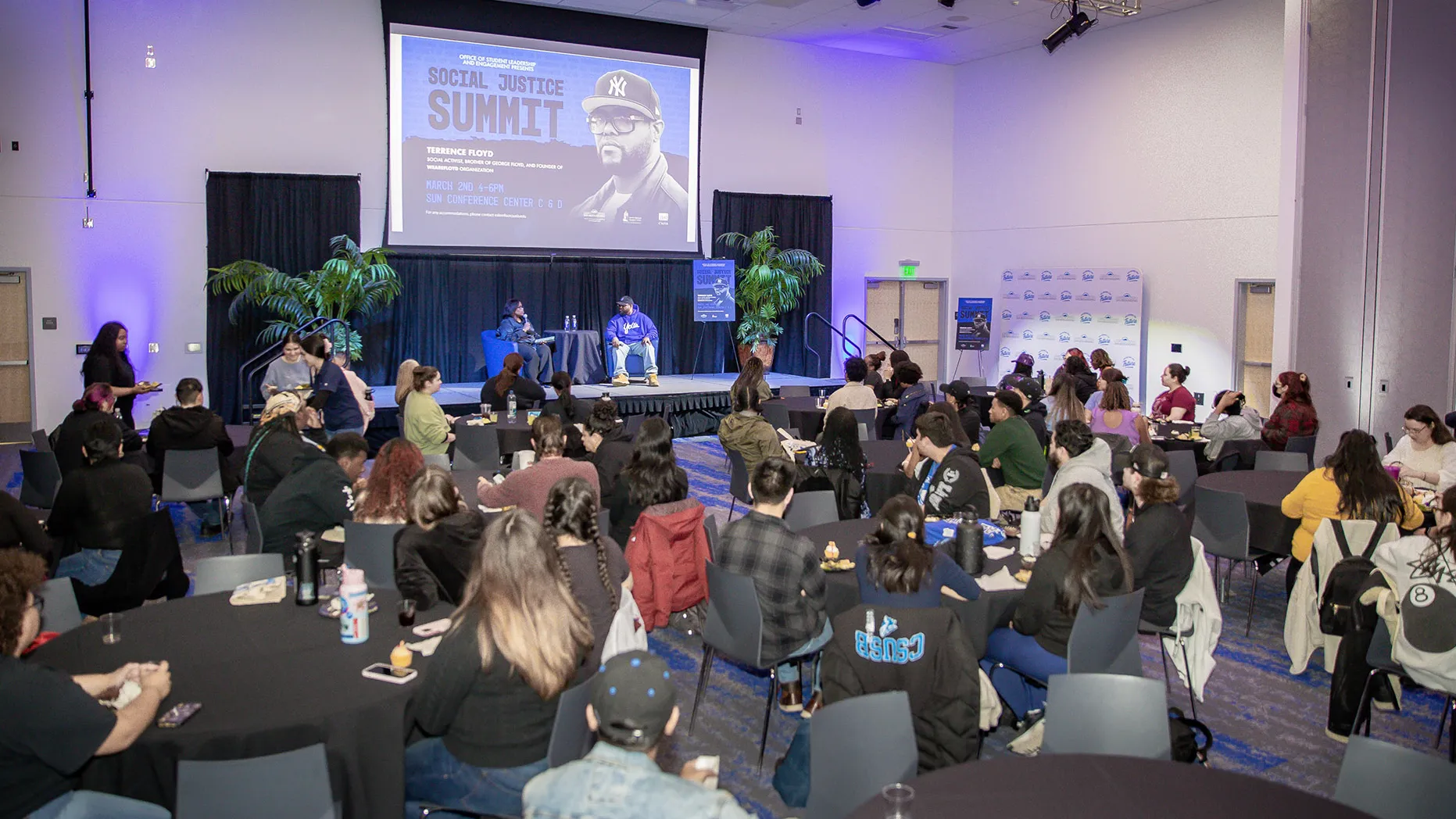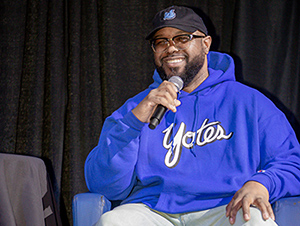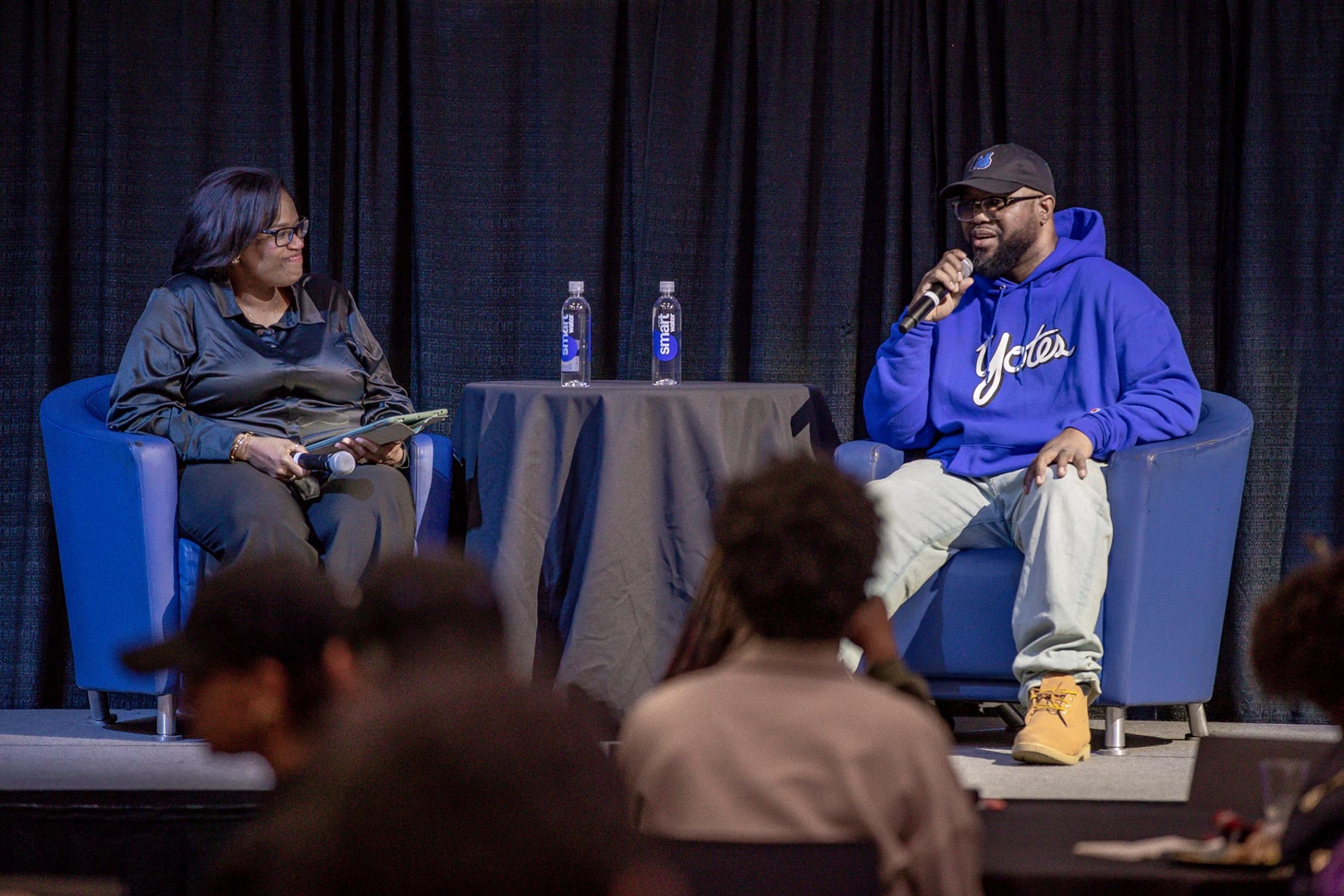Joe Gutierrez | Office of Strategic Communication | (909) 537-5007 | joeg@csusb.edu

Social activist Terrence Floyd visited Cal State San Bernardino on March 2 to spread one significant message: love and unity.
Moderated by Daria Graham, associate vice president for Student Affairs and dean of students, the Social Justice Summit was an opportunity for CSUSB students to hear Terrence discuss various topics, including how to promote change, how to deal with grief, law enforcement and his brother George.
While Terrence did not grow up with his brother, as he lived in New York and his brother lived in Houston, Terrence expressed his longing to get to know his big brother when he was younger.
In 2016, they united at a family function.

“It was like a mirror image on my father,” he remembers, noting that their father, George Floyd Sr., passed in 2002. “That was the first time I got to lay eyes on him and hug him, and here I am well in my 30s, like a little 5-year-old little brother.”
Terrence’s brother, George Floyd, died while in the custody of four Minneapolis, Minn., police officers on May 25, 2020. A video of the incident posted on social media led to widespread protests, the firing of four police officers, the arrest and conviction of one officer on a second-degree murder and related charges, and the other three on charges of aiding and abetting second-degree murder.
Since his brother’s death, Terrence, who is the founder of the We Are Floyd Foundation and a board member of the George Floyd Memorial Foundation, has served as a tireless community leader and grassroots organizer, sharing a message of unity, equality, criminal justice reform, and civil and human rights.
Terrence said that he and a group of friends created We Are Floyd to help “stop this from happening and try to stop it from hitting anybody’s doorstep.”
“I started We Are Floyd because that incident that happened to my brother, it could’ve happened to anybody,” he said. “And it has been happening to people, whether the media caught it or didn’t. It has been happening.”
It was important for Terrence to be inclusive when creating the organization, and when coming up with a name, Terrence asked, “What about We Are Floyd? Because I want to include everybody. To me, it’s not just a black thing or a white thing. It’s a human thing. It’s happening to everybody.”
“Tragedy has become so normalized – how do we keep hope and move forward in faith that there will be a response to this injustice?” Graham asked during the discussion.
“It’s what you’re doing right now,” he responded, looking out to the crowd of CSUSB students. “You’re in school, bettering yourself. … I’ve heard of so many people go on Ancestry.com and so many people have so many nationalities within themselves, so we all family. So, like I said, you’re doing it right now, the first step – being unified to better yourself in this world.”

When it comes to creating change, Terrence stressed the importance of changing mindsets, the power of prayer and figuring out what you could do to promote change. “It only takes one person to spread a message,” he said.
Terrence advised the group that to become leaders, they need to be true to who they are. “Being your own person. Set your own trend. Not following behind someone else. That’s the best way I could put it. … Don’t wait for someone to okay it. Just go for it. That’s a leader.”
While discussing the George Floyd Justice in Policing Act, Terrence said some have an issue with signing it into law because of accountability.
“That’s what needs to be changed. … I grew up and my mother and father always said, ‘You do something bad, you got to pay the consequences,’ so I grew up with accountability,” he said. “So, to see law enforcement and the government not holding themselves accountable and trying to go around the truth, it’s kind of aggravating. And that’s really why it has not been passed yet.”
But it all goes back to the people, Terrence said. “You could sign so many laws, sign so many bills and get them passed, but does that necessarily mean that the ignorance and the negativity is going to stop? No. Why? Because you still got people with the wrong intentions, the wrong mindset, the wrong heart. That’s why I try to stay on the ground. Instead of going to the higher-ups, I stay on the ground and speak to the people.
“That’s why I say you have to change your heart, you have to change your mindset. … Just because someone got on some dirty sneakers or whatever, don’t treat them like they’re beneath you. Treat them like they are your brother or they’re your sister. … That’s my whole message: love and unity.”